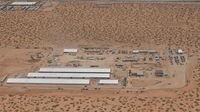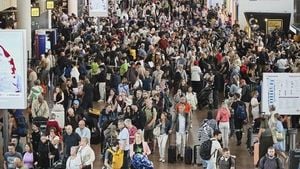In a year already marked by sweeping changes to U.S. immigration policy and enforcement, the Trump administration has moved decisively to expand detention capacity, launching what officials describe as the largest federal immigration detention facility in American history at Fort Bliss in El Paso, Texas. At the same time, new centers are cropping up across the country, and congressional and humanitarian concerns are mounting about oversight and the treatment of detainees.
The new Fort Bliss detention center began receiving its first 100 detainees on August 1, 2025, with plans to expand to 1,000 beds by August 17. According to Pentagon spokesperson Kingsley Wilson, "We will finish construction for up to 5,000 beds in the weeks and months ahead. Upon completion, this will be the largest federal detention center in history for this critical mission." The expansion is part of a broader effort by Immigration and Customs Enforcement (ICE) to increase nationwide capacity, including the planned Speedway Slammer in Indiana, which would add another 1,000 beds as part of a state and federal partnership to create 80,000 additional migrant detention spots nationwide, as reported by Pacific Network and Public News Service.
The Fort Bliss facility, located at "Site Monitor" near Montana Avenue and George Dieter Drive, was announced back in March by former U.S. Secretary of the Army Daniel P. Driscoll. The initial plan called for a capacity of 10,000 detainees, but this was later reduced to 5,000. The project was awarded to Acquisition Logistics LLC, based in Henrico, Virginia, with a $231,878,229 contract following Presidential Executive Order 14159, which outlines using "national security assets for law and order." ICE spokesperson Leticia Zamarripa stated that the facility will provide detainees with access to legal representation, a law library, visitation, and medical treatment, mirroring services available at other ICE facilities.
ICE officials describe Fort Bliss as a deportation hub designed to decompress overcrowded detention centers elsewhere. The facility is also a staging ground for both military and ICE-chartered commercial deportation flights. Since January 24, at least 68 military deportation flights have returned migrants to over a dozen countries, with 13 flights departing from Fort Bliss' Biggs Army Airfield. The majority of these flights have transported immigrants to Guatemala, Honduras, and Ecuador, according to data compiled by immigration advocacy group Witness at the Border.
While the Trump administration touts increased efficiency and capacity, concerns are rising over the conditions within these rapidly expanding facilities and the lack of congressional oversight. U.S. Representative Veronica Escobar, D-El Paso, has been vocal about the challenges. After being blocked from visiting the Montana Avenue ICE facility in June, she filed a lawsuit against the administration. Escobar warned, "It is going to be very challenging to continue to provide oversight if we don't challenge the Trump administration in court. The lawsuit is pretty critical, especially given the massive expansion of immigration detention that is going to happen as the result of Republicans giving tens of billions of dollars to private corporations."
Oversight concerns are not limited to Texas. Nationally, ICE detention centers have come under fire for alleged human rights abuses. A recent report from Georgia Democratic Senator Jon Ossoff documented hundreds of cases of mistreatment at ICE centers, including abuse of children and pregnant women, sexual assault, and denial of legal representation. Amnesty International echoed these concerns in a May 2025 report, specifically highlighting the Montana Avenue facility in El Paso. The Department of Homeland Security has denied such allegations, but the controversy continues to swirl.
The scale of detention is staggering. According to the Prison Policy Initiative, almost 60,000 migrants are currently detained at ICE centers, with an additional 26,000 held in local jails under contracts with the U.S. Marshal Service. Wanda Bertram of the Prison Justice Group noted, "No matter what they have been used to do in the past, holding people who are awaiting trial for other federal crimes, they are currently being used, no doubt about it, to hold immigrants or trumped up immigration-related crime." Most detained migrants have no criminal record and face only civil charges—cases that, in the past, would not have been treated as criminal matters.
In Indiana, the Speedway Slammer is just one part of ICE's ambition to reach 100,000 beds nationwide. Tom Homan, a prominent ICE official, explained, "100,000 beds would create more efficiencies and allow ICE agents to arrest more bad people on the street. And with us hiring at a massive rate, more boots on the ground, we're arresting more criminals, which means we need more beds." These expansions, however, have not gone unchallenged. A federal judge recently halted construction of Florida's so-called Alligator Alcatraz for two weeks to determine if the project violates environmental laws.
The political climate surrounding these developments is tense. President Donald Trump has made immigration enforcement a central plank of his administration. He recently announced plans to try to overturn the law granting home rule to Washington, D.C., and take over the city's police, citing concerns about rising crime—despite the fact that violent crime in the capital actually fell by 25% over the past year, reaching a 30-year low. In another controversial move, the administration is pulling nearly $90 million from New York State's counterterrorism and public safety funding, a decision that comes only a week after a mass shooting in Midtown Manhattan.
The expansion of detention centers and the tightening of immigration enforcement are unfolding against a backdrop of growing humanitarian crises. Israeli Prime Minister Benjamin Netanyahu has announced plans for Israel to take complete control of the Gaza Strip in an effort to eliminate Hamas leadership. Humanitarian organizations report that Gaza is experiencing a "full-blown famine," and Georgia Senator Raphael Warnock condemned the situation, stating, "It is wrong to starve children to death. It is wrong to starve people to death. Yet in this moment we are witnessing a famine unfold among children and innocent men and women in Gaza, the world's largest open-air prison." According to the Times of India, the White House has signaled it will not attempt to block Israel's move.
Meanwhile, the administration's economic policies are also making waves. New tariffs on all U.S. trading partners took effect in early August, imposing a 15% import tax on most products from the European Union, Japan, and South Korea, and a 20% tariff on imports from Taiwan, Vietnam, and Bangladesh. These measures are expected to have significant impacts on global trade and domestic prices.
As the U.S. government accelerates its immigration crackdown and expands detention infrastructure, the debate over oversight, human rights, and the nation’s values only intensifies. With thousands more beds coming online and new legal and humanitarian challenges emerging daily, the eyes of the nation—and the world—remain fixed on America’s evolving approach to immigration and law enforcement.




